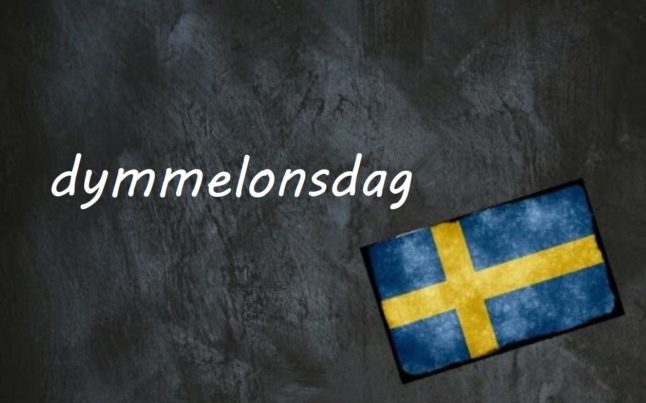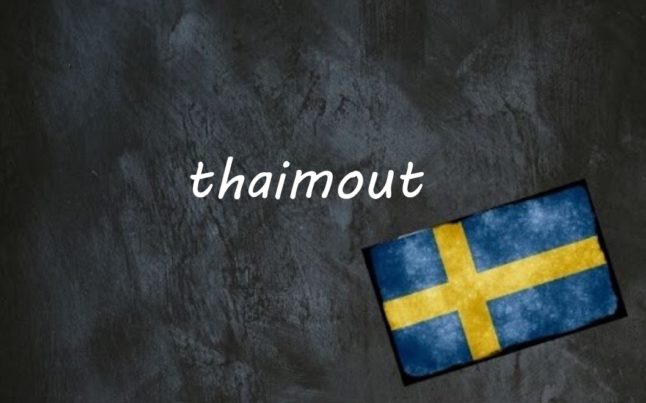There are a few different names for the week before Easter in Swedish, with the most traditional being stilla veckan, or “quiet week”, as it’s the week Jesus is believed to have died. Other terms are passionsveckan (passion week) and tysta veckan (quiet week).
Most people nowadays will just refer to it as påskveckan (Easter week).
The Wednesday of stilla veckan, which has a number of names in English, including Holy Wednesday, Spy Wednesday, Good Wednesday or Great and Holy Wednesday, is known as dymmelonsdag in Swedish.
Onsdag here means Wednesday, named after the Norse god Odin, usually Oden in Swedish (this is where the English word Wednesday comes from too – Woden’s Day, as he was known in Old English).
- Don’t miss any of our Swedish words and expressions of the day by downloading our new app (available on Apple and Android) and then selecting the Swedish Word of the Day in your Notification options via the User button
But what’s a dymmel? Well, the term dates back to medieval traditions for the Wednesday before Easter.
This day was traditionally seen as the first day of påskfriden or “Easter peace”, the three days leading up to Easter where the metal clapper or hammer (the bit inside a church bell which makes it ring) was wrapped in straw or swapped out with a quieter wooden clapper, known as a dymmel.
This dymmel stayed in place until Easter Saturday, after which påskfriden was over and the original metal clapper was put back in place.
It’s not entirely clear where the term dymmel comes from, but an earlier spelling of the word in Old Swedish is dymbil. This may have its roots in English – it bears a resemblance to “dumb bell”, which, before becoming a name for a type of gym equipment, was a type of wooden contraption which church bell ringers could use to practise ringing without making too much noise.
Dumb here is used in its original sense of being silent or unable to speak, rather than the newer meaning of somebody lacking intelligence.
Another term for the week before Easter is dymmelveckan, named after this wooden clapper.
This isn’t the only way in which påskfriden was marked – other sounds were muffled and as little work as possible was to be carried out. Instead, people were supposed to think about Jesus’ life and regret and repent their sins.
Dymmelonsdag was considered to be a dangerous day, so it may not be the best idea to use “dumbbell Wednesday” as a sign to hit the gym.
Tasks that involved things that rotated – such as machines with wheels like spinning wheels and millstones – should be especially avoided, as they were seen as contributing to Jesus’ suffering.
This kind of work was referred to as kringgärningar – roughly translated as “spinning acts”.
In some parts of the country, such as Småland, the dymmel was considered to be some sort of creature, which would mess with the yarns if you spun fibres. In Skåne, it was believed that if you spun yarn on this day, the roof would blow off.
It wasn’t all bad, though. If you made sure not to mention lice or fleas on dymmelonsdag, you wouldn’t see them for the rest of the year, and you could get revenge on a neighbour by running around their manure pile naked before sunrise on dymmelonsdag… although maybe skip that one this year unless you want the police to get involved.
Example sentences:
Skärtorsdag och långfredag känner du redan, men visste du att onsdag i påskveckan heter dymmelonsdag?
You already know about Maundy Thursday and Good Friday, but did you know that Wednesday in Easter Week is known as dymmelonsdag?
Varför heter det dymmelonsdag egentligen?
Why is it called dymmelonsdag?
Villa, Volvo, Vovve: The Local’s Word Guide to Swedish Life, written by The Local’s journalists, is available to order. Head to lysforlag.com/vvv to read more about it. It is also possible to buy your copy from Amazon US, Amazon UK, Bokus or Adlibris.



 Please whitelist us to continue reading.
Please whitelist us to continue reading.
Member comments